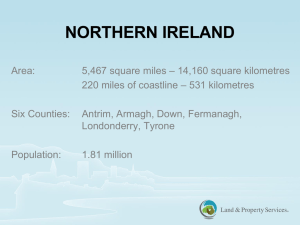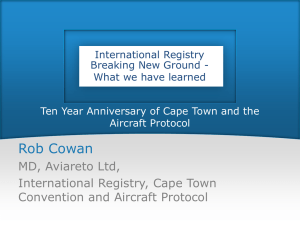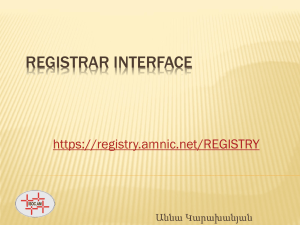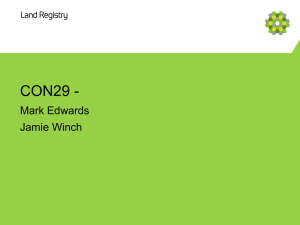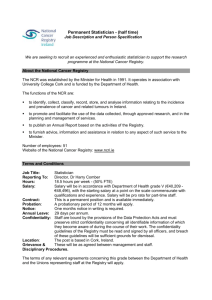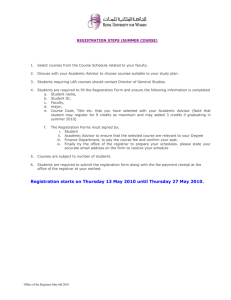ORG Agreement Appendix 10 Service Level Agreement (SLA) (22
advertisement
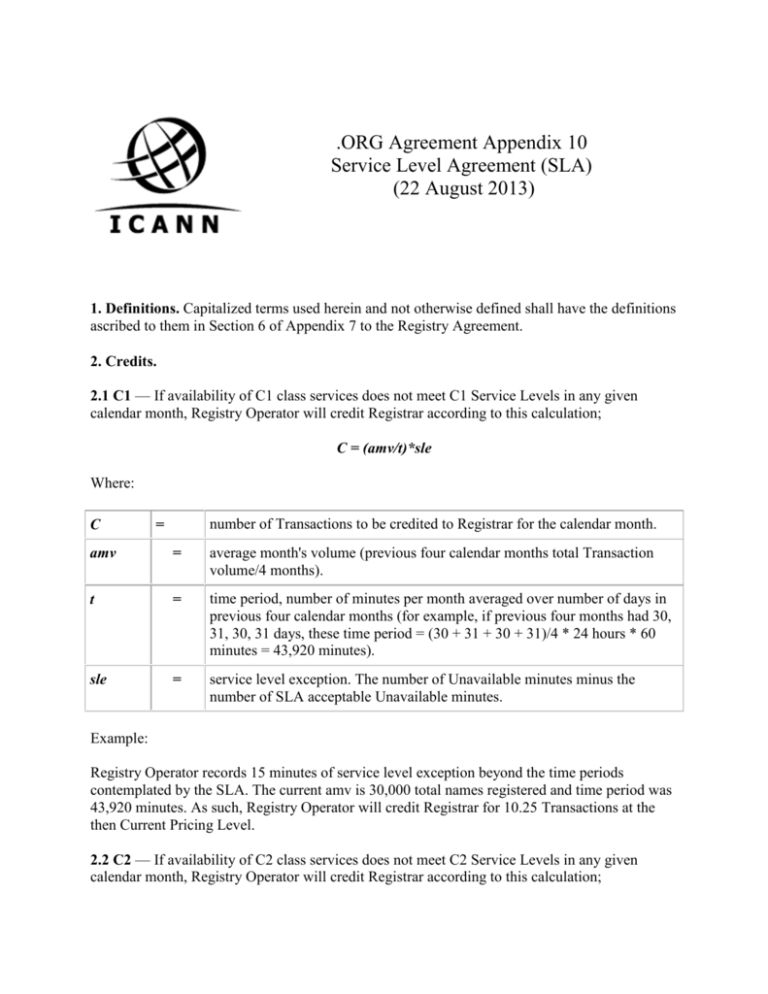
.ORG Agreement Appendix 10 Service Level Agreement (SLA) (22 August 2013) 1. Definitions. Capitalized terms used herein and not otherwise defined shall have the definitions ascribed to them in Section 6 of Appendix 7 to the Registry Agreement. 2. Credits. 2.1 C1 — If availability of C1 class services does not meet C1 Service Levels in any given calendar month, Registry Operator will credit Registrar according to this calculation; C = (amv/t)*sle Where: C number of Transactions to be credited to Registrar for the calendar month. = amv = average month's volume (previous four calendar months total Transaction volume/4 months). t = time period, number of minutes per month averaged over number of days in previous four calendar months (for example, if previous four months had 30, 31, 30, 31 days, these time period = (30 + 31 + 30 + 31)/4 * 24 hours * 60 minutes = 43,920 minutes). sle = service level exception. The number of Unavailable minutes minus the number of SLA acceptable Unavailable minutes. Example: Registry Operator records 15 minutes of service level exception beyond the time periods contemplated by the SLA. The current amv is 30,000 total names registered and time period was 43,920 minutes. As such, Registry Operator will credit Registrar for 10.25 Transactions at the then Current Pricing Level. 2.2 C2 — If availability of C2 class services does not meet C2 Service Levels in any given calendar month, Registry Operator will credit Registrar according to this calculation; C = (amv/t)*sle * 60% Where: C = number of Transactions to be credited to Registrar for the calendar month. amv = average month's volume (previous four calendar months total Transaction volume/4 months). t = time period, number of minutes per month averaged over number of days in previous four calendar months (see example in Subsection 2.1). sle = service level exception. The number of Unavailable minutes minus the number of SLA acceptable Unavailable minutes. 60% = priority adjustment. Example: Registry Operator records 15 minutes of service level exception beyond the time periods contemplated by the SLA. The current amv is 30,000 total names registered and time period was 43,920 minutes. As such, Registry Operator will credit Registrar for 6.15 Transactions at the then Current Pricing Level. 2.3 C3 — If availability of C3 services does not meet C3 Service Levels in any given calendar month, Registry Operator will credit Registrar according to this calculation; C = (amv/t)*sle * 30% Where: C = number of Transactions to be credited to Registrar for the calendar month. amv = average month's volume (previous four calendar months total Transaction volume/4 months). t = time period, number of minutes per month averaged over number of days in previous four calendar months (see example in Subsection 2.1). sle = service level exception. The number of Unavailable minutes minus the number of SLA acceptable Unavailable minutes. 30% = priority adjustment. Example: Registry Operator records 15 minutes of service level exception beyond the time periods contemplated by the SLA. The current amv is 30,000 total names registered and the time period was 43,920 minutes. As such, Registry Operator will credit Registrar for 3.07 Transactions at the then Current Pricing Level. 2.4 Degraded Performance — If the performance of the transactive systems (OpenXRS API, Whois) does not meet the performance expectations outlined in Service Levels over the calendar month in question, Registry Operator will credit Registrar according to this calculation; C = (amv/t)*sle * 7.5% Where: C = number of Transactions to be credited to Registrar for the calendar month. amv = average month's volume (previous four calendar months total Transaction volume/4 months). t = time period, number of minutes per month averaged over number of days in previous four calendar months (see example in Subsection 2.1). sle = service level exception. The number of Degraded Performance minutes. 7.5% = priority adjustment. Example: Registry Operator records 15 minutes of service level exception beyond the time periods contemplated by the SLA. The current amv is 30,000 total names registered and time period was 43,920 minutes. As such, Registry Operator will credit Registrar for 0.77 Transactions at the then Current Pricing Level. 2.5 Receipt of Credits — In order for Registrars to claim credits, the following procedure must be followed: 2.5.1 Issue a Request for SLA Credits. The claiming Registrar must make a request for credits to Registry Operator within 7 days of the SLA violation claiming that it experienced downtime or degraded performance in excess of what is outlined in Appendix 7. 2.5.2 Provide documentation to indicate SLA violation. A Registrar must provide documentation in the form of either: 2.5.2.1 Registrar initiated notification(s) to the Registry Operator of a down time that exceeded SLA limits, including the trouble ticket number issued by the Registry Operator. The closing ticket(s) should be included as well in order to determine the total downtime (unless the closing ticket includes this); or 2.5.2.2 Notification from the Registry Operator (with trouble ticket number attached) of down time or degraded performance. The closing ticket(s) should be included as well in order to determine the total downtime (unless the closing ticket includes this). 2.5.2.3 Confirmation of SLA violation: Upon the request of the Registry Operator, the claiming Registrar must provide reasonably available server and/or application logs demonstrating a violation of the SLA limits. The Registrar is expected to demonstrate response times from point of entry into the registry server complex to point of exit from the registry server complex. This will exclude any time taken by establishing a TCP connection, the SSL handshake and EPP/RRP logon to the registry. 2.5.3 Justification of Volume. In order to calculate credits, the Registrar should include volume figures for the past four (4) calendar months, and a certification that these numbers accurately reflect the LEAST registration activity that would be covered during the affected SLA outage. 2.5.4 Receipt of Credit. When the above steps have been completed to the Registry Operator's satisfaction, the Registry Operator shall provide notification of the number of credits that will be entered in the Registrar's account balance and that can be used immediately toward registrations in the Registry. Under no circumstances shall credits be applied when the availability problems are caused by network providers and/or the systems of individual Registrars. 3. Responsibilities of the Parties. 3.1 The affected ICANN-Accredited Registrar shall assist Registry Operator by reporting each occurrence of alleged Service Unavailability to Registry Operator customer service help desk in the manner required by Registry Operator (i.e., e-mail, fax or telephone) in order for an occurrence to be treated as Service Unavailability for purposes of this SLA. Registry Operator will treat all system performance problems in order of decreasing severity and fix them within a commercially reasonable period of time. Incidents flagged by the measurement system will also qualify as ticketed events and will be classed as Unavailability. 3.2 Registry Operator will perform monitoring from internally located systems as a means to verify that the conditions of the SLA are being met. 3.3 The SLA will be reconciled on a quarterly basis. 3.4 The Registrar will have the option to choose which of the credit calculations described in Section 2 of the SLA will apply where service level credit overlaps occur. There can be several types of credits over the same calendar month, but the Registrar can only claim one type of refund for each event. 3.5 Registry Operator will not attempt to discern what discount levels were in effect at the specific time of a service level exception, but rather use the discount level in effect at the time the credits issue. All service level credits will be paid out using the appropriate discounts and rate levels reflected by the then current rate schedule. 3.6 The Registrar may, under reasonable terms and conditions, audit the reconciliation records for the purposes of verifying service level performance. The frequency of these audits will be no more than once every six-month period during the term of the Registry-Registrar Agreement between Registry Operator and the Registrar. 3.7 Incident trouble tickets must be opened within a commercially reasonable period of time. 3.8 In the event that Service Unavailability affects all Registrars, the Registry Operator shall use commercially reasonable efforts to open a blanket trouble ticket and immediately notifying all Registrars of the trouble ticket number and details. 3.9 Both Registrar and the Registry Operator agree to use reasonable commercial good faith efforts to establish the cause of any alleged Service Unavailability. If it is mutually determined to be a Registry Operator problem, the issue will become part of the Unplanned Outage Time. 3.10 Registrars must inform the Registry Operator in writing or by opening a ticket any time their estimated volume of transactions (excluding check domain commands), will exceed their previous calendar month's volume by more than 25%. In the event that a Registrar fails to inform Registry Operator of a forecasted increase of volume of transactions of 25% or more and the Registrar's volume increases 25% or more over the previous month, and should the total volume of transactions added by the Registry Operator for all Registrars for that month exceed the Registry Operator's actual volume of the previous month's transactions by more than 20%, then the Registrar(s) failing to give such notice will not be eligible for any SLA Credits in that Monthly Timeframe. Registrars shall provide their forecasts at least 30 days prior to the first day of the next calendar month. In addition, the Registry Operator agrees to provide monthly transaction summary reports starting no later than 60 days after the Commencement-of-Service Date. 3.11 The Registry Operator will notify Registrar of Planned Outages outside the Planned Outage Period at least 7 days in advance of such Planned Outage. In addition, Registry Operator will use reasonable commercial good faith efforts to maintain an accurate 30 day advance schedule of possible upcoming Planned Outages. 3.12 The Registry Operator will update the Whois Service on a near real-time basis. During normal operation, all registration and information updates sent from a Registrar to the Registry are stored in the primary database set (database A). The information in database A is replicated to a backup database set at regular intervals, normally within five (5) minutes. The Whois Service uses replicated databases as its source of information. The time lag in the Whois information update is determined by the database replication interval. The Registry Operator will notify Registrars in advance when changes to the Whois Service update schedule occur. 3.13 The Registry Operator will initiate the addition, deletion or other modification of DNS zone information to its DNS service within 5 minutes after a Transaction. The Registry Operator will notify Registrar in advance when changes to the schedule occur. The Registry Operator will notify Registrars regarding any scheduled maintenance and unavailability of the TLD nameservers. 3.14 The Registry Operator will use commercially reasonable efforts to restore the critical systems of the System within 24 hours in the event of a force majeure and restore full system functionality within 48 hours. Outages due to a force majeure will not be considered Service Unavailability. 3.15 The Registry Operator will provide Service Availability percentages during each Monthly Timeframe as listed in Section 6(A)4.1 — Service Level Matrix of Appendix 7. 4. Miscellaneous. 4.1 This Appendix is not intended to replace any term or condition in the Registry-Registrar Agreement. 4.2 Dispute Resolution will be handled pursuant to the arbitration provisions of the RegistryRegistrar Agreement.

